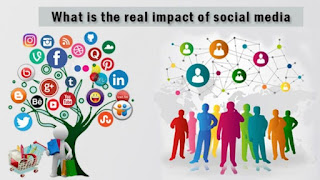The Impact of Social Media on Mental Health
Introduction
In today's digital age, social media has become an integral part of ourn vchmgfyjggkgutklives. Platforms like Facebook, Instagram, Twitter, and Snapchat dominate our online interactions, offering unprecedented opportunities for connection and communication. However, alongside the benefits, there's a growing concern about the impact of social media on mental health. Social media has revolutionized the way we communicate, allowing us to stay connected with friends, family, and even strangers from around the world. However, the pervasive nature of social media has raised questions about its effects on mental well-being. While it's undeniable that social media offers many benefits, such as facilitating social connections and providing a platform for self-expression, it's also clear that excessive or irresponsible use can have negative consequences for mental health.
The Positive Effects of Social Media
Despite its drawbacks, social media also has several positive effects on mental health. One of the most significant benefits is its ability to facilitate social connections. For many people, especially those who may be geographically isolated or have difficulty forming in-person relationships, social media provides a valuable outlet for staying in touch with loved ones and making new friends.
Furthermore, social media can serve as a support network for individuals struggling with mental health issues. Online communities and forums dedicated to topics like depression, anxiety, and addiction offer a safe space for people to share their experiences, seek advice, and find solidarity with others facing similar challenges.
Additionally, social media plays a crucial role in raising awareness about mental health issues and reducing the stigma surrounding them. Through campaigns, hashtags, and personal stories shared online, social media platforms have helped spark important conversations about mental health and encourage people to seek help when needed.
The Negative Effects of Social Media
Despite its potential benefits, social media also has a dark side when it comes to mental health. One of the most significant concerns is its role in exacerbating feelings of loneliness and isolation. While social media can connect us with others, it can also lead to feelings of inadequacy and FOMO (fear of missing out) when we compare our lives to the carefully curated images and updates shared by others.
Another serious issue is cyberbullying, which has become increasingly prevalent on social media platforms. The anonymity and distance provided by the internet make it easier for people to engage in hurtful behavior without considering the impact on their victims. This can lead to profound psychological distress, including anxiety, depression, and even thoughts of suicide.
Furthermore, social media's addictive nature can take a toll on mental health. The constant stream of notifications, likes, and comments triggers the brain's reward system, leading to compulsive behavior and a sense of dependency on these platforms. This can interfere with real-world relationships, productivity, and overall well-being.
The Complex Relationship between Social Media and Mental Health
It's essential to recognize that the relationship between social media and mental health is complex and multifaceted. While it's clear that excessive or irresponsible use can have negative consequences, social media isn't inherently harmful. In fact, when used mindfully and in moderation, it can enhance social connections, provide support networks, and even promote mental health awareness.
Strategies for Mitigating Negative Effects
To minimize the negative impact of social media on mental health, it's crucial for individuals to take proactive steps to protect their well-being. This might involve setting limits on social media use, such as designating specific times of day for browsing and taking regular breaks to engage in offline activities. It's also essential to seek support from trusted friends, family members, or mental health professionals if you're struggling with negative emotions or harmful behaviors related to social media.
Moreover, cultivating a healthy sense of self-esteem that isn't dependent on external validation is key to mitigating the negative effects of social media. Instead of measuring your worth based on likes, shares, or followers, focus on nurturing real-world relationships, pursuing meaningful activities, and practicing self-care.
Conclusion
In conclusion, social media has a profound impact on mental health, both positive and negative. While it can facilitate social connections, provide support networks, and raise awareness about mental health issues, it can also exacerbate feelings of loneliness, contribute to cyberbullying, and fuel addictive behavior. It's essential for individuals to be mindful of their social media usage and take steps to prioritize their mental well-being in the digital age.
FAQs (Frequently Asked Questions)
Is social media addiction a real thing?
Yes, social media addiction is a recognized phenomenon characterized by excessive use, preoccupation with social media, withdrawal symptoms when unable to access it, and negative consequences in various areas of life.
How can I tell if social media is negatively impacting my mental health?
Pay attention to your feelings and behaviors surrounding social media use. If you find yourself feeling anxious, depressed, or constantly comparing yourself to others, it may be a sign that social media is negatively impacting your mental health.
What can I do if I'm being cyberbullied on social media?
If you're experiencing cyberbullying, it's essential to reach out for support from trusted friends, family members, or authorities. You can also block or report the perpetrator on the social media platform and take steps to protect your privacy and security online.
Are there any benefits to taking breaks from social media?
Yes, taking breaks from social media can have numerous benefits for mental health, including reduced stress, improved sleep, increased productivity, and a greater sense of presence and connection in real-world interactions.
How can I use social media in a way that promotes my mental health?
To use social media in a way that promotes your mental health, set boundaries around your usage, engage mindfully with content, prioritize real-world relationships, and seek out positive and supportive communities and content online.

Comments
Post a Comment